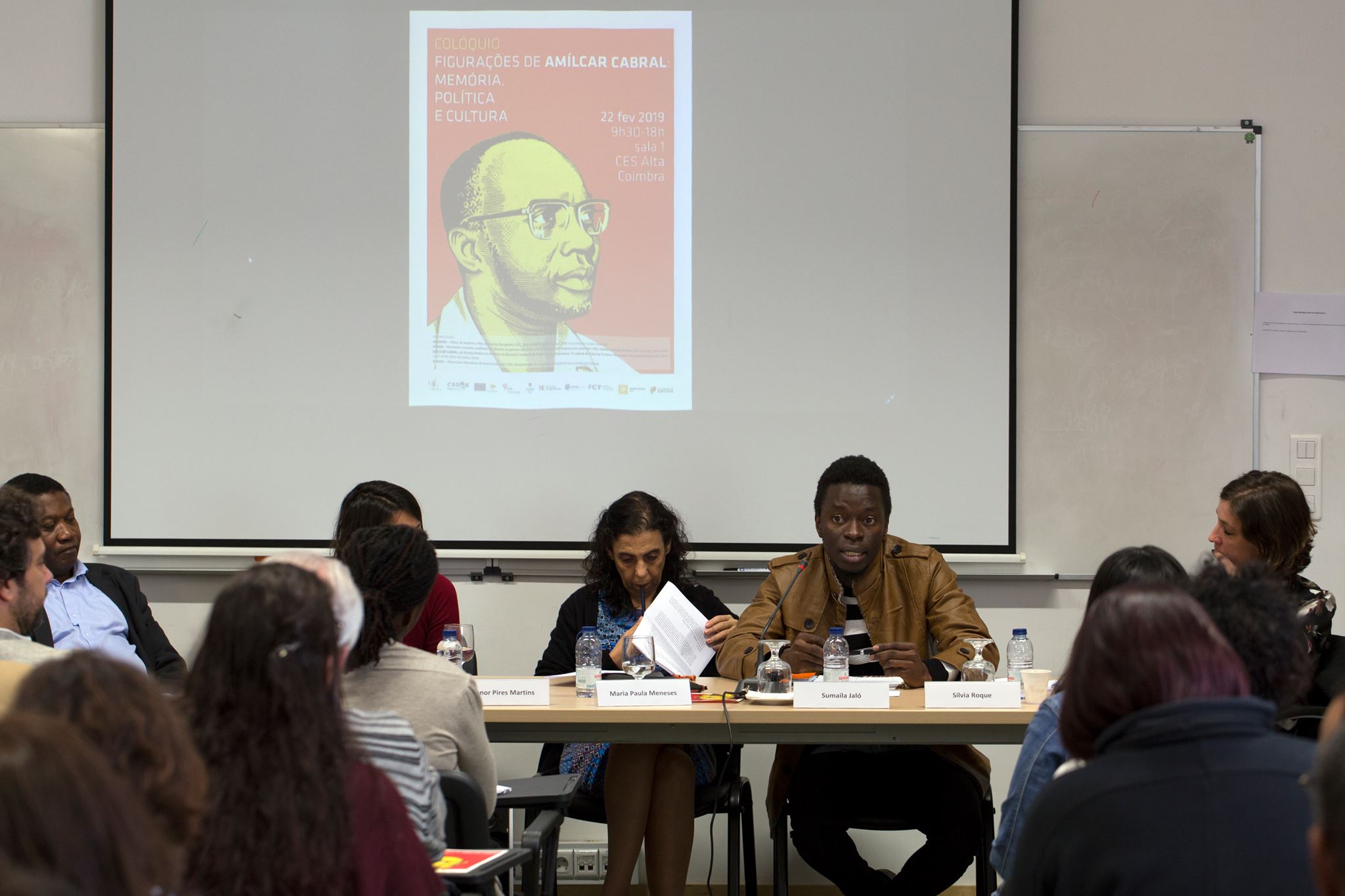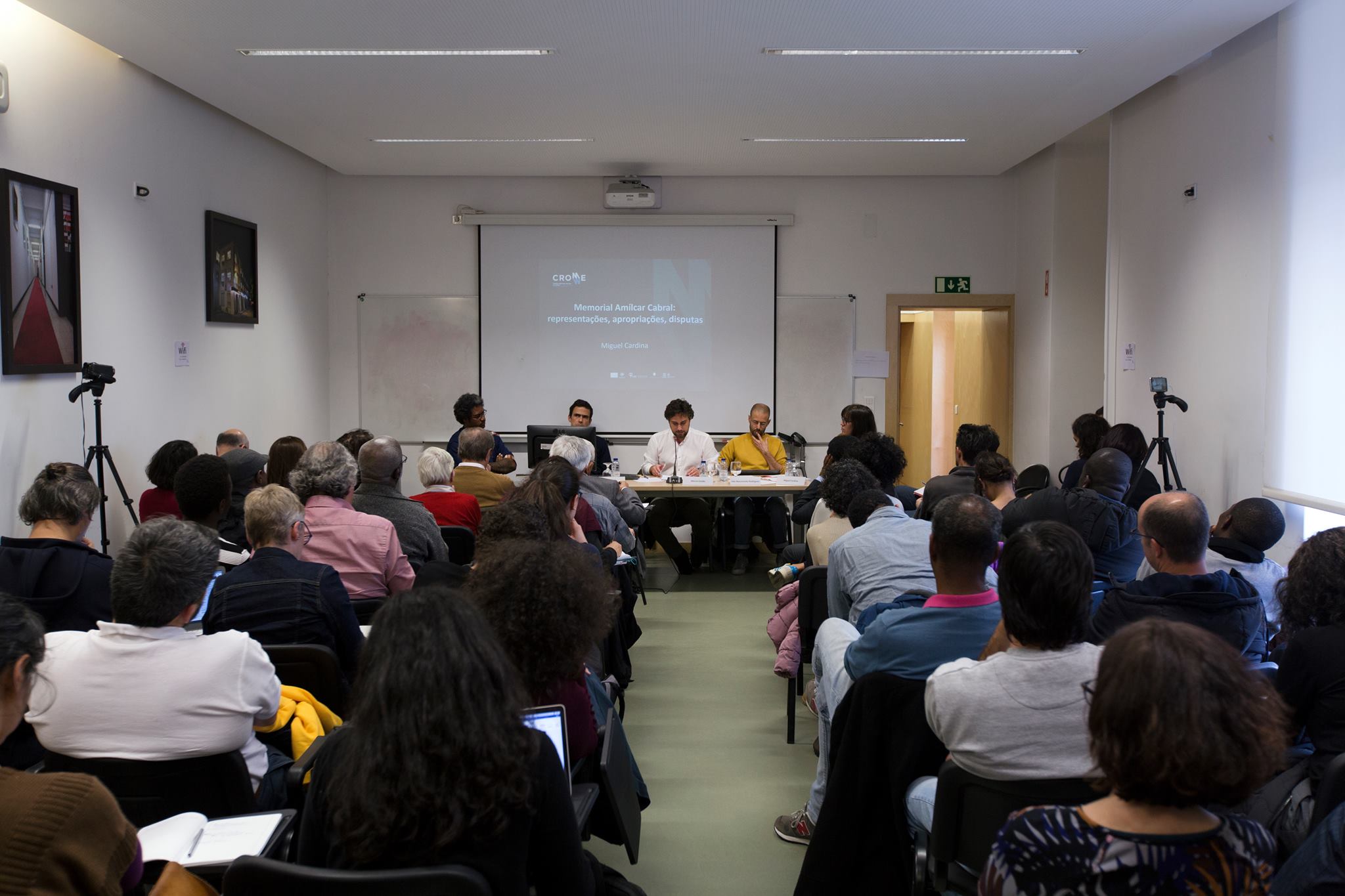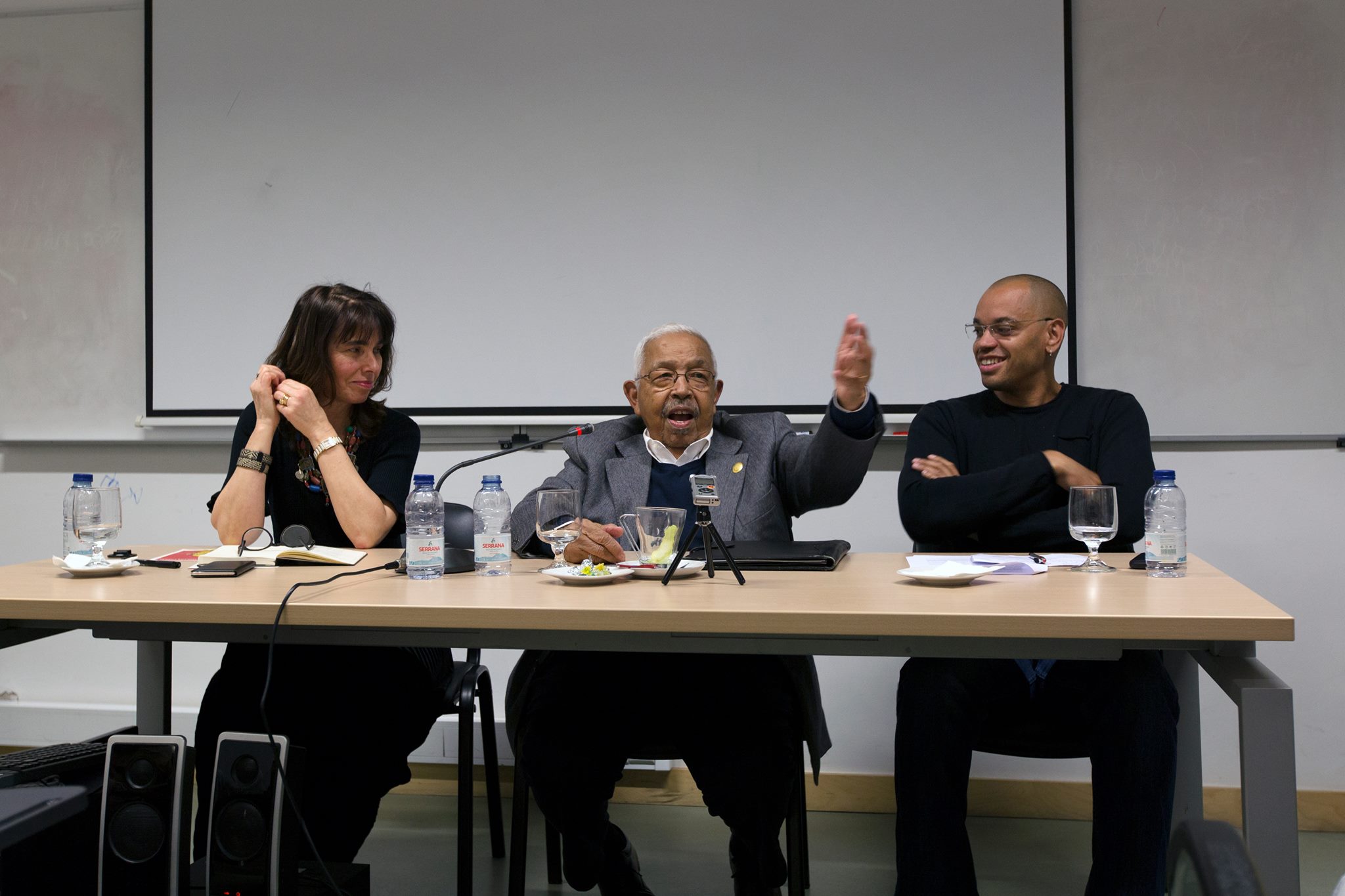ECHOES - European Colonial Heritage Modalities in Entangled Cities
H2020 – European Project | Coord. by University of Hull | Portuguese team led by Paulo Peixoto and Lorena Sancho Querol, CES
COMBAT - Combating racism in Portugal: an analysis of public policies and antidiscrimination law
National Agency for Science and Technology (FCT) | coord. by Silvia Maeso, Centre for Social Studies, University of Coimbra
07 jul 2019 | Universidade Popular dos Movimentos Sociais – Memória, Património, Colonialismo e Anti-Racismo (coorganização com os projetos ECHOES e COMBAT)
Read more...
O MEMOIRS, em conjunto com os projectos ECHOES e COMBAT do Centro de Estudos Sociais da Universidade de Coimbra e com as associações DJASS - Associação de Afrodescendentes, INMUNE - Instituto da Mulher Negra em Portugal, e a IC - Iniciativa Cigana, desenvolveram uma oficina da Universidade Popular dos Movimentos Sociais (UPMS). A UPMS é uma plataforma horizontal, co-construída e protagonizada pelas pessoas que nela participam, num espaço de interconhecimento e convívio, partilha e fortalecimento inter-político. Estas oficinas têm por objectivo fomentar o diálogo entre movimentos sociais e a academia, fortalecendo as lutas pela justiça cognitiva e social. Esta oficina dedicou-se à reflexão sobre Memória, Património, Colonialismo e Anti-Racismo no Espaço Misturado em Lisboa.
CROME - Crossed Memories, Politics of Silence: The Colonial-Liberation Wars in Postcolonial Times
ERC Starting | Miguel Cardina, Centro de Estudos Sociais, Universidade de Coimbra
22 fev 2019 | Seminário “Figurações de Amílcar Cabral: memória, política e cultura" (coorganização com os projetos Crome, Amílcar Cabral, da História Política às Políticas da Memória e ECHOES )
Read more...
O colóquio Figurações de Amílcar Cabral – memória, política e cultura reúne investigadores de três projetos que, a partir de diferentes olhares, estudam e lidam com a figura política, cultural e artística de Amílcar Cabral. Ao longo deste dia, a partir de um ponto de vista interdisciplinar e multiforme a biografia, o pensamento, a ação política, as imagens e as heranças de Amílcar Cabral, tanto do ponto de vista artístico como político irão estar em discussão em três mesas redondas temáticas, seguidas de debate. A conferência final está a cargo de Pedro Pires e um debate final reunirá todos os intervenientes.
11 dec 2018 | Seminar Memory Studies: Theories, Practices, Perspectives, with Emily Keightley and Francisco Ferrándiz (Org.: CROME, ECHOES, MEMOIRS and the PhD Programmes in Discourses: Culture, History and Society (CES | FEUC | FLUC), Human Rights in Contemporary Societies (CES | IIIUC,) International Politics and Conflict Resolution (CES | FEUC) and Postcolonialisms and Global Citizenship (CES | FEUC)
Read more...
Emily Keightley | Transmission, Transition and Trajectory: Temporal and Spatial Challenges for Memory Studies
Over the last 20 years memory studies has transitioned from a small research niche at the intersection of a number of humanities and social science disciplines to a rich and broad subfield with its own journal, multiple professional associations, and considerable influence in the various fields from media and communications to History. In many ways the field has moved apace, engaging with the implications of rapidly shifting communications technology for the character and quality of contemporary engagements with the past, the role of memory postcolonial societies, and mobilisation in troubled political times. Nevertheless some of the earliest intellectual challenges which early theorisations of social and cultural remembering grappled with remain very much alive and troublesome in contemporary memory studies research. In this talk I would like to address three such (interconnected) challenges and, using examples from my own current research project Migrant memory and the Postcolonial Imagination, think through the ways in which we might address them in contemporary work. These are issues of memory transmission over time and over space. In relation to the first of these challenges, I will consider how the movement of memories through time has been conceived, particularly in relation to mnemonic transmission across and between social scales, from the individual to the collective to the cultural. In doing so I will consider the limitations and elisions in accounts of movements of memory over time and go on to consider how the concept of the mnemonic imagination might help to address some of these issues. At the same time mobility and movement has become increasingly central to contemporary understandings of memory and remembering practices. Concepts such as transnational, transcultural and multidirectional memory have been used to explain the ways in which memories embedded in cultural forms move over time and space and in doing so how they shape contemporary social and personal identities. However we still have a relatively limited understanding of (a) what happens to memories as it moves across space and (b) how to understand these spatial movements as always also temporal in character. I will propose that we need to think more in terms of mnemonic trajectories to address the ways in which memories move across time and space, particularly under the conditions of late modernity which are so marked by social and cultural dynamics of mobility and immobility.
Francisco Ferrándiz | Engaging with the Spanish Civil War Legacy
This presentation is based on a fifteen-year-long ethnography of mass grave exhumations in contemporary Spain and deals with the much-disputed and incomplete unmaking of a concrete and massive militaristic inscription of Spain: that related to its last internal war (1936-1939) and subsequent dictatorship (1939-1975). To understand this process and its historical roots, the presentation first dissects the formation of a funerary apartheid in the country since the end of the war. Secondly, it analyzes the impact on the social fabric of the mass-grave exhumations of Republican civilians that started in the year 2000. Thirdly, it traces how these disinterments have intersected with Spain’s most prominent Francoist stronghold, the Valley of the Fallen, and threaten the dictator’s burial place. Finally, it discusses the parallel dismantling of the dictatorship’s official statuary which once presided over prominent public spaces in many cities and some military quarters. It argues that rolling back militarization by dismantling war-derived cartographies of death, challenging military burial arrangements or degrading statues of generals necessarily involves a certain level of remilitarizing by other means. I call this mirroring and deeply embodied memorial backfiring phantom militarism.
24 may 2017 | Seminar with Elsa Peralta, "Preenchendo vazios: perda, guerra e trauma no testemunho do retorno"
Read more...
Como resultado da descolonização, estima-se que entre 500.000 e 800.000 colonos portugueses tenham abandonado a sua residência em África. Na sua maior parte, estas populações vêm para Portugal, embora outras possibilidades se tenham delineado, como a África do Sul ou o Brasil. Em Portugal foram nomeados ‘retornados’, um nome que adquire uma conotação pejorativa usado para identificar, e acusar, uma população colona, na sua maioria branca, subitamente deslocada devido ao colapso do sistema colonial de que era beneficiária.
Nesta apresentação a aoradora irá centrar-se nas narrativas de memória do retorno de África, detidas e transmitidas por aqueles que foram participantes neste evento histórico. Relatos testemunhais, juntamente com textos ficcionais, compõem um campo memorial no seio do qual a guerra, a violência, a perda e o trauma são expressos e internalizados na esfera social. Feitos de fragmentos frequentemente justapostos e não raras vezes contraditórios, estes testemunhos, longe de corresponderem à univocidade representada pela categoria ‘retornado’, comportam no seu seio muitas heterogeneidades, tal como heterogéneas são as pessoas integradas neste universo populacional.
11 may 2017 | Seminar with Joana Gorjão Henriques: "Racismo em Português - o lado esquecido do colonialismo"
Read more...Following over 100 interviews and reports in the five African countries colonised by Portugal, Racismo em Português - o lado esquecido do colonialismo reflects on the scars left in the occupied territories. Listening to the African version of recent colonial history, this is a reflection on how racism was used to dominate. It is the beginning of a conversation with those who are interested in having a critical view of colonialism.
27 apr 2017 | Seminar with Christoph Kalter (Freie Universität Berlin): "Portugal's Retornados: The Success Story of Integration and What is Wrong With it"
Read more...
Based on research on state-paid housing for Portugal’s so-called retornados after 1974, this talk argues that the dominant narrative of a successful integration of these migrants into Portuguese society is in need of qualification. While integration was in fact overall successful, it must be stressed that it was also uneven in its nature and that it brought considerable hardships for many migrants. Furthermore, and going beyond the question of its factual accuracy, the 1970s success story of integration must be seen a (post-)colonial, nationalist master narrative that needs to be historicized and critically deconstructed - even more so since it has resurfaced forcefully since the 2000s.
10 feb 2017 | conférence de Benjamin Stora: "La montée de l’extrême-droite en France et les mémoires coloniales"
Read more...
As eleições presidenciais em França de 2017, a relação entre a ascensão da extrema-direita neste país e a memória colonial, os atentados de que tem vindo a ser alvo e a centralidade da França na construção europeia, foram temas abordados pelo historiador francês Benjamin Stora que, em 2016 publicou, com o romancista Alexis Jenni, Les Mémoires Dangereuses.
COLOUR, The Colour of Labor
ERC Advanced | Cristiana Bastos, Instituto de Ciências Sociais, Universidade de Lisboa
26-29 jun 2018 | Advanced Summer School with Ann Laura Stoler: "Along and Against Archival Grains", Institute of Social Sciences, University of Lisbon
Read more...
Advanced Summer School “Along and Against Archival Grains” with distinguished Professor Ann Laura Stoler (New School University, NY). The event is jointly organized by the European Research Council projects COLOUR and MEMOIRS and will take place from 26 to 29 June 2018 at the Institute of Social Sciences (ICS, University of Lisbon)
The Summer School will have three components:
1. Masterclass series (9 am – 12 am), requiring previous readings and
active participation in the seminar discussions;
2. Public lectures (1 pm – 2.30 pm)
3. Exploring living archives (3 pm-5pm)
10 Abril 2019 | Ciclo de debates: "Narrativas afro-europeias: memória, mediação e imaginação"
Read more...10 abr 2019 | 18H00 | NOVA FCSH, Lisboa | Edifício ID, Sala Multiusos 3
Conversa com: Ana Paula Tavares (Poetisa, investigadora no CLEPUL - UL),Diana Andringa (Jornalista, investigadora, CES - UC), Dulce Cardoso (Escritora), Margarida Calafate Ribeiro (Investigadora do CES - UC; Coordenadora da Cátedra Eduardo Lourenço, Univ. de Bolonha), Yara Monteiro (Escritora) Moderação: Maria Agusta Babo (Professora da FCSH, Investigadora no ICNOVA).
15 mar 2017 | Seminar with Teresa Cruz, Maria Augusta Babo and Cláudia Madeira
Read more...
Language Acts and Worldmaking
AHRC Open World Research Initiative | Catherine Boyle, King´s College, London
27 e 28 abr 2020 | "(Multi)Cultural mediations: how Slam can be a tool when teaching a foreign language" | King’s College, London
Read more...30 nov 2018 | Workshop Diaspora, identity and language learning. SLAM creative writing, King's College London
Read more...
Slam poetry is a laboratory for identity, personal expression and lexical creativity. This workshop was designed to fit within the framework of the Diasporic Identities and Language Transitions strands of Language Acts and Worldmaking. Joëlle, a Belgium-Congolese artist who often uses Lingala language in her slamming, led participants in examining the link between colonial memories and how languages move between different linguistic and cultural worlds in the slam writing and performance. French, Spanish, English and Portuguese language teachers worked together to write slam poetry to discover themselves - developing slam poems around their names, characters, origins and possessions, and mixing them with words, colours, feelings, body parts - and at the end of the day there was a SLAM performance.
EXCHANGE - Forensic Geneticists and the Transnational Exchange of DNA data in the European Union: Engaging Science with Social Control, Citizenship and Democracy
ERC Consolidator | Helena Machado, Universidade do Minho
24 abr 2019 | "Memória, transmissão, pós-memória - o que dizem os filhos do império”, Universidade do Minho
Read more...Doutoramento Patrimónios de Influência Portuguesa
Centro de Estudos Sociais e Instituto de Investigação Interdisciplinar, Universidade de Coimbra
18 mai 2018 | Oficina Internacional: The legacies of empire: contexts, cases and dynamics
Read more...A oficina internacional " The legacies of empire: contexts, cases and dynamics" foi organizada pelo doutoramento Patrimónios de Infuência Portuguesa e contou com a parceria do Projeto Memoirs e uma comunicação da Investigadora Principal Margarida Calafate Ribeiro: "Colonial Memories in European Postmemory".
19-20 oct 2017 | The fields of decolonisation: the (post)colonial African cases and dynamics of the Portuguese empire (organização: Miguel Bandeira Jerónimo (Universidade de Coimbra), Alexander Keese (Université de Genève).
Read more...The two-day, workshop-format intense conference will attempt to promote new research concerning the Portuguese late colonial and the early independent societies, promoting a multidimensional and multi-layered approach. The workshop aims to: (1) push a colonial-postcolonial analysis forward, questioning clear divides and assumed continuities; (2) move beyond high-politics and include social topics (lato sensu) and social history appraisals; (3) gather and intersect different analytical perspectives and topics related to late colonialism, decolonization and the post-colonial momentum; (4) promote a critical assessment and use of archives and sources of various kinds.
26 ago 2016 | Seminário Patrimónios: modos de olhar, integrado no programa do IX Festival Nacional da Cultura de Moçambique (organização: Camões, Instituto da Cooperação e da Língua e Univ. Zambeze).
Read more...Este seminário esteve integrado no programa do IX Festival Nacional da Cultura de Moçambique e centrou-se na reflexão sobre património de forma integrada, abrangente e plural, recorrendo a uma perspetiva interdisciplinar onde os eixos da discussão foram a língua e o território. Este seminário contou com a comunicação da Investigadora Principal do Projeto Memoirs Margarida Calafate Ribeiro.
22 a 24 ago 2016 | Ciclo de conferências Patrimónios: modos de olhar (organização Camões, Instituto da Cooperação e da Língua em parceria com o Centro de Estudos Sociais da Universidade de Coimbra e a Faculdade de Arquitetura e Planeamento Físico da Universidade Eduardo Mondlane).
Read more...O Ciclo de Conferências produzido pelo Centro Cultural Português em parceria com o Centro de Estudos Sociais da Universidade de Coimbra (Doutoramento Patrimónios de Influência Portuguesa e Projeto Memoirs) e a Faculdade de Arquitetura e Planeamento Físico da Universidade Eduardo Mondlane. Centrou-se na reflexão sobre património de forma integrada, abrangente e plural, recorrendo a uma perspetiva interdisciplinar onde os eixos da discussão foram a língua e o território. O ciclo contou com três comunicações de investigadores MEMOIRS: Margarida Calafate Ribeiro, Mónica V. Silva e Nuno Gonçalves.











